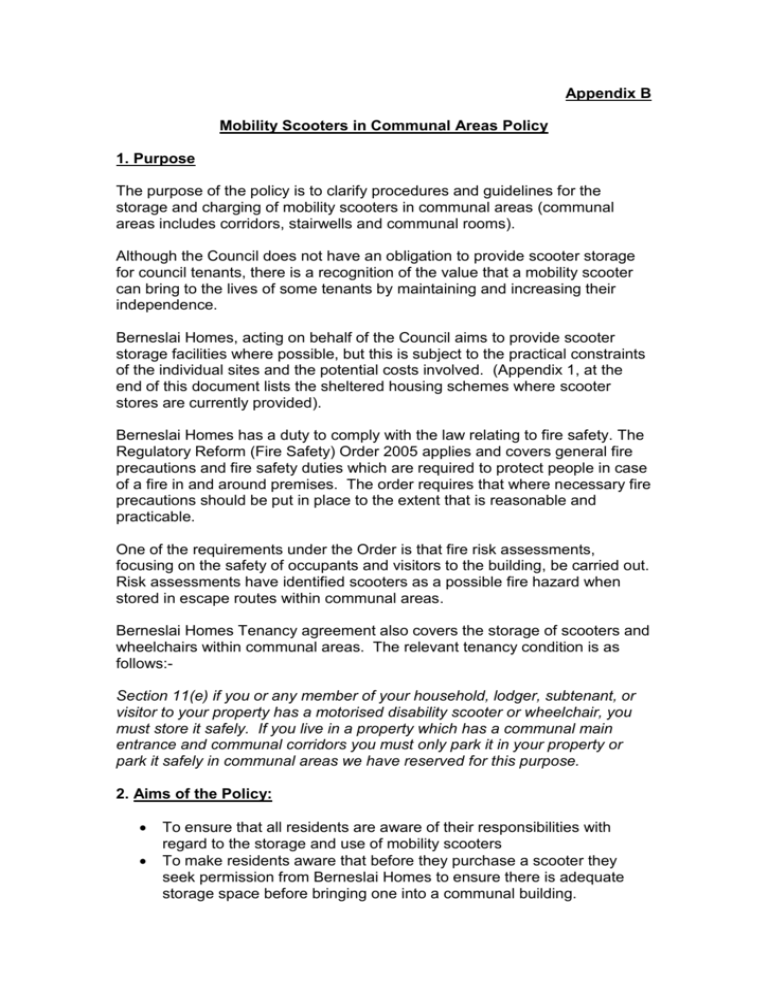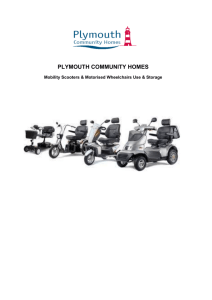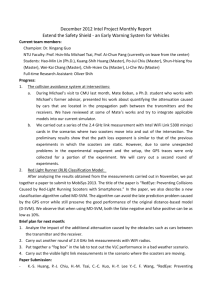Mobility Scooter Policy - Draft
advertisement

Appendix B Mobility Scooters in Communal Areas Policy 1. Purpose The purpose of the policy is to clarify procedures and guidelines for the storage and charging of mobility scooters in communal areas (communal areas includes corridors, stairwells and communal rooms). Although the Council does not have an obligation to provide scooter storage for council tenants, there is a recognition of the value that a mobility scooter can bring to the lives of some tenants by maintaining and increasing their independence. Berneslai Homes, acting on behalf of the Council aims to provide scooter storage facilities where possible, but this is subject to the practical constraints of the individual sites and the potential costs involved. (Appendix 1, at the end of this document lists the sheltered housing schemes where scooter stores are currently provided). Berneslai Homes has a duty to comply with the law relating to fire safety. The Regulatory Reform (Fire Safety) Order 2005 applies and covers general fire precautions and fire safety duties which are required to protect people in case of a fire in and around premises. The order requires that where necessary fire precautions should be put in place to the extent that is reasonable and practicable. One of the requirements under the Order is that fire risk assessments, focusing on the safety of occupants and visitors to the building, be carried out. Risk assessments have identified scooters as a possible fire hazard when stored in escape routes within communal areas. Berneslai Homes Tenancy agreement also covers the storage of scooters and wheelchairs within communal areas. The relevant tenancy condition is as follows:Section 11(e) if you or any member of your household, lodger, subtenant, or visitor to your property has a motorised disability scooter or wheelchair, you must store it safely. If you live in a property which has a communal main entrance and communal corridors you must only park it in your property or park it safely in communal areas we have reserved for this purpose. 2. Aims of the Policy: To ensure that all residents are aware of their responsibilities with regard to the storage and use of mobility scooters To make residents aware that before they purchase a scooter they seek permission from Berneslai Homes to ensure there is adequate storage space before bringing one into a communal building. To ensure that mobility scooters are not stored in any communal areas causing obstruction or increasing the risk of fire spread. To ensure that residents are aware that they will be held liable for injury to other people or any damage caused to the building or communal areas, and will be re-charged for any damage. 3. Storage of Mobility Scooters in Sheltered Housing Schemes 3.1 Allocation of a space Before a resident acquires a mobility scooter, they are advised to seek permission from the scheme warden to ensure there is adequate space in the scooter store . Mobility scooters must not be stored in any of the communal areas or corridors. Storage space is limited, and allocation of a space in a scooter store will be done on a first come, first served basis. The scheme warden will manage and allocate the spaces within each sheltered housing scheme, by recording the date and time a request is made. It is possible for mobility scooters to be stored inside residents own homes but it is the tenants responsibility to first ensure that there is sufficient space to store it safely, and should not block any fire escape routes. 3.2 Recharging of batteries and maintenance Mobility scooters should be recharged within the designated charging area, and should be charged according to the manufacturer’s instructions. Recharging should only be carried out during day time hours, and not overnight. All scooters must have an up to date Portable Appliance Test (PAT test) to ensure that the charging equipment is in good condition. The PAT test will be carried out by Berneslai Homes on an annual basis. Residents must make sure that the equipment is available for testing when notified of the date. If any equipment fails the PAT test, it will be the scooter owner’s responsibility to repair/replace the damaged item before it can be used again. Residents must ensure that the scooter is serviced and maintained regularly, and this is the responsibility of the scooter owner. 4. General needs housing tenants and leaseholders Mobility scooters will only be allowed where a tenant can safely store and charge the scooter without hindering safe escape from the property in the case of fire. In these cases tenants/leaseholders will not need to apply for permission. Scooters cannot be stored or charged in communal corridors or stairwells. Tenants/Leaseholders will need to gain permission for any alteration that may be required, for example the provision of a ramp, access path or hard standing, garage, shed etc. 5. Insurance Cover Insurance is not legally required for Mobility Scooters. However, where a resident wishes to use a mobility scooter within a communal building they are advised to obtain appropriate insurance cover including: Public liability insurance, covering accidental damage to a third party and property Some policies also cover additional losses from fire, theft and damage Neither Berneslai Homes nor Barnsley MBC will be liable for any claims arising from the use of Mobility Scooters. It is the scooter owner’s responsibility to ensure they comply with the use of invalid carriages on highways regulations 1988. This includes registering all class 3 vehicles with DVLA for road use. 6. Action against mobility scooters All residents allocated a space in a scooter store must agree and comply with the conditions stated in the policy. Berneslai Homes reserves the right to withdraw permission at any time if any of the conditions are not met. Sheltered housing scheme wardens will periodically check the scooter store but tenants also have a responsibility to ensure that the store is left secure, tidy and free from trip hazards. Anyone using the store that has any concerns should report them to the Scheme Warden or Impact officer. If a resident/tenant or leaseholder acquires a scooter and there is no room to safely store it, enforcement action will be taken under the current tenancy regulations. 7. Charges for usage of Scooter Storage An annual charge will be made for the use of the store, this charge is a contribution towards the costs of the electricity, PAT testing and on-going maintenance of the store. The annual charge is currently set at £24.00 plus VAT and will be payable at £2.00 per month (0.50p per week) plus VAT. Appendix 1 Sheltered Housing Schemes with Scooter Store Provision The following schemes have a scooter store: Churchfields, Barnsley Hudsons Haven, Wombwell Woodhall Flats, Darfield Glebe Court, Tankersley Willowcroft, Bolton on Dearne Church Street Close, Thurnscoe Sandhill Court, Great Houghton Grange House, Brierley Please be aware that there are limited spaces within the stores. There is currently no scooter storage provision at the following schemes: Shipcroft, Wombwell Heather Court, Bolton on Dearne Pendon House, Penistone Saville Court, Hoyland Common King Street, Barnsley There is no provision within the multi-story blocks, Buckley House, Albion House or Britannia House.






